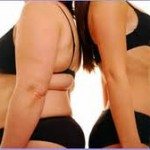Weight loss – common myths
 More Australians are overweight or obese than ever before, and the numbers are steadily increasing. Around 68 per cent of men and 55 per cent of women are carrying too much body fat and 25 per cent of children are overweight or obese. This means that the incidence of obesity-related disorders, such as coronary heart disease and diabetes, is also on the rise. In a study in the Redlands, Cleveland, Capalaba, Wynnum and Manly areas these statistics hold true and it cost the community in health related problems.
More Australians are overweight or obese than ever before, and the numbers are steadily increasing. Around 68 per cent of men and 55 per cent of women are carrying too much body fat and 25 per cent of children are overweight or obese. This means that the incidence of obesity-related disorders, such as coronary heart disease and diabetes, is also on the rise. In a study in the Redlands, Cleveland, Capalaba, Wynnum and Manly areas these statistics hold true and it cost the community in health related problems.
There’s no magic weight loss potion
Dieting has led to many unhealthy misconceptions about weight loss. There are no magical foods or ways to combine foods that melt away excess body fat. To reduce your weight, you need to make small, achievable changes to your lifestyle. You need to change the way you eat, increase your physical activity and change your mental outlook.
There is no magic bullet to weight loss. Weight loss should be a holistic approach that should include food, exercise and the way you think. The mental aspect of weight loss is often left out of the equation and yet this is probably the aspect that is most often not addressed. One of the best ways to tackle the mental approach to weight loss is hypnosis as this enables you to easily adjust your mental attitude to eating and weight loss. This is precisely why virtual gastric banding is such a effective way to get the image that you want and to keep it.
Low, moderate or high-carbohydrate diets
In the short term, very low-carbohydrate diets can result in greater weight loss than high-carbohydrate diets but in the long term weight loss differences appear to be minimal. Very low- carbohydrate diets can be unhealthy if too much animal fat is consumed and if plant foods are overly restricted. The long-term safety of these diets is unknown.
Five food myths exposed
There are many myths about foods – what you should eat and when you should eat them. We expose five myths as false!
1. Potatoes make you fat – false
It was once thought that the key to weight loss was eliminating all high-carbohydrate foods, including pasta, rice and potatoes. We now know that carbohydrates are the body’s preferred energy source. Eating a potato, or any type of carbohydrate rich food, won’t automatically make you fatter. However, if you are watching your weight, enjoy potatoes in moderate quantities and be careful of how you eat them (for example, butter and sour cream are high in fats).
You have to regularly eat more energy than your body needs to put on weight. This is harder to do with high-carbohydrate foods than high-fat foods. Eating a diet high in carbohydrate (and also fibre) is likely to push fat out of the diet.
2. Food combining diets really work – false
There are plenty of diets based on the belief that the digestive system can’t tackle a combination of foods or nutrients. Commonly, carbohydrates and proteins are said to ‘clash’, leading to digestive problems and weight gain. The opposite is often true. Foods eaten together can help the digestive system. For example, vitamin C in orange juice can increase iron absorption from a meal rich in plant-based iron like beans and rice, lentils and other legumes.
Very few foods are purely carbohydrate or purely protein; most are a mixture of both. The digestive system contains enzymes that are perfectly capable of breaking down all the foods we eat. Food combining diets should be avoided.
3. Breakfast should consist of fruit only – false
There is no evidence that eating only fruit at breakfast has any health or weight loss benefits. Most fruits are not very high in complex carbohydrates, which the body needs after an all-night fast. They are, however, a good source of fibre and vitamins. Cereal foods (especially wholegrain varieties) like bread, muffins and breakfast cereals are a much better source of carbohydrates to get you going in the morning.
4. There are some magical foods that cause weight loss – false
Some foods, such as grapefruit or kelp, are said to burn off body fat. This is not true. Dietary fibre comes closest to fulfilling this wish because it provides a feeling of ‘fullness’ with minimal kilojoules. High-fibre foods such as fruit, vegetables, wholegrain breads and cereals, and legumes also tend to be low in fat.
5. Drinking while you are eating is fattening – false
The theory behind this misconception is that digestive juices and enzymes will be diluted by the fluid, and this will slow down the digestion and lead to excess body fat. There is no scientific evidence to back this up. In fact, evidence suggests that drinking water with your meal improves digestion. Kilojoule-heavy drinks such as alcoholic beverages can be fattening if consumed in excess, but drinking them with meals doesn’t make them more so.
Suggestions for safe and effective weight loss include:
- Don’t crash diet. You’ll most likely regain the lost weight within five years.
- Aim for slow weight loss. You should lose no more than 0.5kg a week or 10kg in six months.
- Aim for a healthy waist circumference of less than 94cm for men and less than 80cm women.
- Cut down on dietary fats, especially saturated fat, and choose low fat varieties where possible.
- Cut back on refined sugars.
- Increase your intake of fresh fruit, vegetables and wholegrain breads and cereals.
- Consume less alcohol.
- Eat less takeaway and snack foods.
- Exercise for approximately 30 minutes at least a few times every week. Introduce more movement into your day – try to accumulate 30 minutes of walking daily.
- Don’t eliminate any food group. Instead choose from a wide range of foods every day and choose ‘whole’, less processed foods. Have a regular pattern of eating and stick to it.
- Drink at least 1,500ml of water per day.



